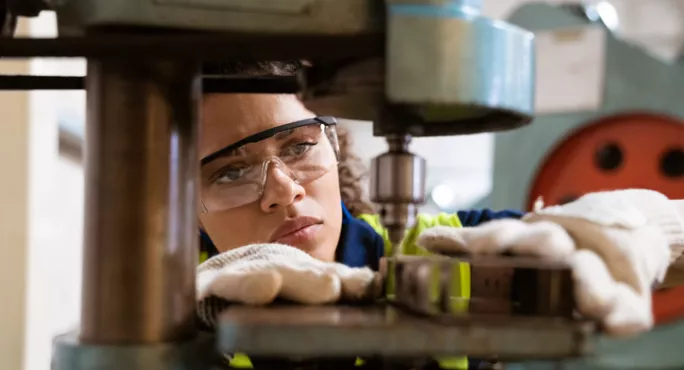- Home
- MPs: Apprenticeships must get ‘substantial investment’
MPs: Apprenticeships must get ‘substantial investment’

The government must make a substantial investment in apprenticeships to support the UK’s economic recovery, a group of MPs has said.
In a report published today, the All-Party Parliamentary Group (APPG) on Apprenticeships urged the government to make substantial investment in apprenticeships and work with industry to create greater confidence in the system.
The report sets out 15 recommendations to support and accelerate the growth of quality apprenticeships in the UK including a national policy for free travel for apprenticeships by 2021, reform of the apprenticeship levy to create greater flexibility and pausing expiry of levy funds for six months to support businesses.
The report also recommends developing a cross-departmental apprenticeship strategy between government and industry to respond to Covid-19.
Background: What the chancellor’s plans mean for FE and skills
Opinion: The missing piece of Sunak’s puzzle? Degree apprentices
News: Colleges to receive £96m for coronavirus catch-up
APPG chair Karin Smyth MP said: “Quality apprenticeships have a significant role to play in helping people learn new skills and provide a strong pathway for career development. With the UK facing its worst economic downturn in a century, it has never been more important to invest in apprenticeships.
“The benefits of supporting apprenticeships are clear, from hands-on training to developing new skills and gaining confidence in a working environment.
“The group’s call for evidence found that many educators and businesses have been able to adapt to lockdown measures but greater flexibility is needed in the system to support employers and educators to continue to implement blended learning styles.
“The government needs to be committed to investing in apprenticeships, through establishing free travel for apprentices and working with industry to develop a cross-departmental strategy to ensure apprenticeships are a key pillar of the UK’s economic recovery.”
In his statement at the beginning of July, chancellor Rishi Sunak announced that the government would introduce a new payment of £2,000 to employers in England for each new apprentice they hire aged under 25. For employers hiring apprentices over the age of 25, there will be a £1,500 payment.
The recommendations in full
- A cross-departmental apprenticeship strategy must be developed between government and industry to respond to Covid-19.
- The government should set up an apprenticeship working group with employers, training providers, professional bodies and associations as well as unions to develop innovative ways to retain apprentices and ensure the continuing talent pipeline. Training providers should work to ensure that learning materials are accessible through as many online platforms as possible including mobile phones and games consoles.
- The government must take additional steps to support flexible approaches to learning and working for apprentices that have been developed through lockdown, examples could include reforming how End Point Assessments are implemented.
- The government must implement further proposals to ensure that young people are not exploited in the labour market by assessing the long-term employment progression opportunities for apprentices.
- The government should provide apprentices with free travel by 2021.
- Government must reform the apprenticeship levy to create greater flexibility, through allowing a proportion of levy funding to be spent on “off-the-job” costs and pre-apprenticeship programs to encourage disadvantaged groups into apprenticeships.
- The government must ensure that apprenticeship levy is sustainable in the long term and gives employers and providers the stability they need to invest in apprenticeships.
- The Department for Education (DfE) should collect and publish comprehensive data on the provision of careers advice in schools, in order to identify areas of best practice or targets for improvement.
- The DfE must work in collaboration with schools to establish knowledge and awareness programmes targeted at parents and carers as well as students and staff to encourage the promotion of apprenticeships for school leavers.
- The DfE should create a centre of excellence to encourage best practice among trainers.
- The Institute for Apprenticeships and Technical Education (IfATE) should simplify standards to support the learning of essential skills rather than focusing on specific occupations.
- The IfATE should simplify and centralise apprenticeship applications, through the creation of a single Ucas-like system that will support school children in understanding the benefits of apprenticeships.
- The IfATE and Ofsted should undertake stronger enforcement of the rules and regulations surrounding apprenticeships to prevent exploitation, unfair pay and poor-quality training.
- Businesses should be encouraged to include requirements for technical or vocational qualifications that equate to the degree levels for management positions where appropriate.
- The treasury should pause the expiry of Apprenticeship Levy funds for at least six months, to support businesses through the pandemic.
A Department for Education spokesperson said: “Apprenticeships are an excellent way to get into a wide range of rewarding careers, and they will continue to play a vital role in delivering the skills employers need and that will support our economic recovery post Covid-19.
“We have introduced a number of flexibilities such as allowing apprentices to take a break from their learning or moving to remote learning or assessments where possible, even if they are put on furlough.
“We also recently announced significant new investment to help more people to kick-start a high quality apprenticeship opportunity. This includes providing £2,000 to employers for each new apprentice they hire aged under 25 and a £1,500 payment for each new apprentice they hire aged 25 and over. We will also ensure there is sufficient funding to support small businesses wanting to take on an apprentice this year.”
Keep reading for just £1 per month
You've reached your limit of free articles this month. Subscribe for £1 per month for three months and get:
- Unlimited access to all Tes magazine content
- Exclusive subscriber-only stories
- Award-winning email newsletters



